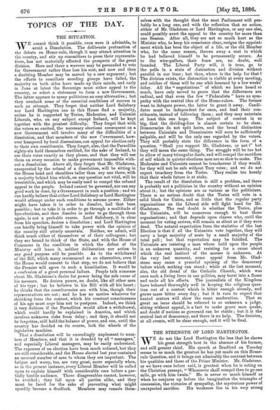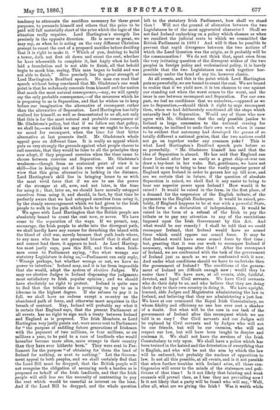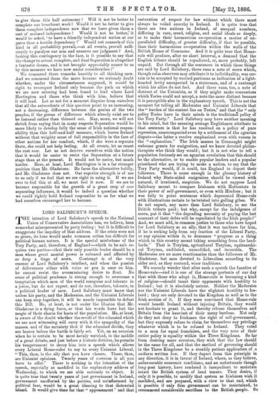THE STRENGTH OF LORD HARTINGTON.
WE do not like Lord Hartington the less that he shows his great strength best in the absence of his former, and still greater chief. His speech at Bradford on Tuesday seems to us much the greatest he has yet made on this Home- rule Question, and it brings out admirably the contrast between his qualities and those of the Prime Minister. Mr. Gladstone, as we have once before said, is greatest when he is acting on the Christian precept, "Whosoever shall compel thee to go one mile, go with him twain." He is never so much himself as when he conjures up before the imagination the triumphs of concession, the victories of sympathy, the mysterious power of unexpected sacrifice. His weakness lies in his very strong tendency to attenuate the sacrifices necessary for these great purposes, to persuade himself and others that the price to be paid will fall materially short of the price which the logic of the situation really requires. Lord Hartington's strength lies precisely in the opposite direction. He is never so great, we may say, as when he is acting on the very different Christian precept to count the cost of a proposed sacrifice before deciding that it is right to make it. "Which of you, desiring to build a tower, (loth not first sit down and count the cost, whether he have wherewith to complete it, lest haply when he hath laid a foundation and is not able to finish, all that behold begin to mock him, saying, This man began to build and was not able to finish." Here precisely lies the great strength of Lord Hartington's Bradford speech. No man can read that speech without being convinced that Mr. Gladstone's one weak point is that he sedulously conceals from himself and the nation that much the most natural consequence,—nay, we will openly say the only probable consequence,—of the measures which he is proposing to us is Separation, and that he wishes us to keep before our imagination the alternative of reconquest, rather than the alternative of Separation. Lord Hartington has fully realised for himself, as well as demonstrated to us all, not only that this is far the most natural and probable consequence of Mr. Gladstone's policy, but that if we follow out that policy, we shall be,—we think we may even say we ought to be,—in no mood for reconquest, when the time for that bitter alternative at last presents itself. Mr. Gladstone's whole appeal goes on different lines. It is really an appeal which puts so very strongly the grounds against what people choose to call coercion, that they would be false to all the principles they now adopt, if they proposed coercion when the time came to choose between coercion and Separation. Mr. Gladstone's weakness—though from an oratorical point of view it is skill—lies in keeping out of his own view and out of our view that this grim alternative is lurking in the distance. Lord Hartington's skill lies in bringing home to us with the most vivid force that if we are to use the power of the stronger at all, now, and not later, is the time for using it ; that, later on, we should have morally estopped ourselves from using it, and should, in fact, by that time be perfectly aware that we had estopped ourselves from using it, by the steady encouragement which we had given to the Irish people to walk in the path which leads to Separation. We agree with Lord Hartington that the British people are absolutely bound to count the cost now, or never. We have come to the separation of the ways. If we permit, nay, encourage, the Irish people to strike into the divergent path, we shall hardly have any excuse for drenching the island with the blood of civil war, merely because that path leads where, to any man who has not promised himself that it shall not and cannot lead there, it appears to lead. As Lord Harting- ton most justly says, pass this Bill, and then when Irish- men come to Parliament saying, 'See what wrongs our statutory Legislature is doing us,'—Parliament can only reply, Wrongs perhaps, but whether wrongs or not, we have no power to interfere.' Ireland may, and it. is far from impossible that she would, adopt the system of elective Judges. We may see elective Judges in Ireland dispensing the judgments most satisfactory to Irish popular opinion ; and we should
have absolutely no right to protest. Ireland is quite sure to find that the tribute she is promising to pay to us is irksome in the highest degree. If she refuses to pay it in full, we shall have no redress except a re-entry on the abandoned path of force, and otherwise must acquiesce in the
breach of contract. Nay, Ireland will probably say what it is certain that England says, that the present Parliament at
all events, has no right to sign such a treaty between Ireland and England as is proposed. The Irish Members, as Lord Hartington very justly points out, were never sent to Parliament for " the purpose of saddling future generations of Irishmen with the payment of two millions, or four millions, or six millions a year, to be paid to a race of landlords who would hereafter become more alien, more strange to their country
than they have ever hitherto been." They were sent to Par- liament for the purpose "of obtaining for them the land of
Ireland for nothing, or next to nothing." Let the Govern- ment appeal to both peoples, and we shall certainly find that the Land Bill must be dropped, that the British people will not recognise the obligation of assuming such a burden as is proposed on behalf of the Irish landlords, and that the Irish people will still less see the necessity of contracting to pay the rent which would be essential as interest on the loan. And if the Land Bill be dropped, and the whole question left to the statutory Irish Parliament, how shall we stand then ? Will not the ground of alienation between the two Legislatures be of the most aggravated character ? Shall we not find Ireland embarking on a policy which shames us when we recollect the judicial rents to which we committed the
British Parliament in 1881? And will it then be possible to prevent that rapid divergence between the two nations cf which the Land Question was the origin, as it probably will be the consummation ? We do not think that, apart even from the very irritating question of the divergent wishes of the two peoples in foreign policy and ecclesiastical policy, it is barely possible that the two Legislatures can work together har- moniously under the bond of any tie, however elastic.
At all events, and this is the point which Lord Hartington puts so powerfully, we are bound to count the cost. We are bound to realise that if we yield now, it is ten chances to one against our standing out when the worst comes to the worst, and the issue is one between reconquest and Separation. For our own part, we feel no confidence that we ourselves,—opposed as we are to Separation,—should think it right to urge reconquest then, when we had deliberately sanctioned all the steps which naturally lead to Separation. Would any of those who now agree with Mr, Gladstone that the only possible justice to Ireland is large concession to the national craving for autonomy, be inclined to undo their own work when it came to be evident that autonomy had developed the germs of so totally different a national genius, that the two nations could
not go on together under any common yoke This is what Lord Hartington's Bradford speech puts before us so powerfully. "Mr. Gladstone himself has said that the idea of Separation is absurd. He has said that England can draw Ireland after her as easily as a great ship-of-war can draw a toy-boat in her wake. But, gentlemen, we have not found it so easy to bring to bear the vastly superior power of England upon Ireland in order to govern her up till now, and are we certain that in future, if the question of absolute Separation is raised, we shall find it any easier to bring to bear our superior power upon Ireland ? How would it be raised ? It would be raised in the form, in the first place, of a demand for the suspension of the English tribute, of the payments to the English Exchequer. It would be raised, pro- bably, if England happens to be at war with a powerful State, in the form of a declaration of independence. It would be raised in the form of a refusal of the Irish to pay the tribute or to pay any attention to any of the restrictions imposed upon the Irish Government by this Act. And what would be our remedy ? I shall be told that we could reconquer Ireland, that Ireland would have no armed force which could oppose our armed force. It may be that Ireland would have some armed force by that time ; but, granting that it was our work to reconquer Ireland if necessary, what happens after that? After the reconquest of Ireland, we are confronted with the task of the government of Ireland just as much as we are confronted with it now. And under what conditions should we have to undertake then the government of Ireland ? The conditions of the govern- ment of Ireland are difficult enough now ; would they le
easier then? We have now, at all events, able, faithful, devoted, and loyal Civil servants. We have Civil servants who do their duty to us, and who believe that they are doing
their duty to their own country in doing it. We have upright, learned, able Judges and Magistrates administering the law in
Ireland, and believing that they are administering a just.law. We have at our command the Royal Irish Constabulary, on whose fidelity and efficiency no one has ever cast a shadow of a doubt. But what will be the case in our task of the government of Ireland after this reconquest which we are told is so easy ? Our Civil servants and our Judges will be replaced by Civil servants and by Judges who will not
be our friends, but will be our enemies, who will not respect our law, but will have been taught to despise and
contemn it. We shall not have the services of the Irish Constabulary to rely upon. We shall have a police which has been trained in the hatred and the detestation of everything that is English, and who will be not the arm by which the law will be enforced, but probably the nucleus of opposition to law. Is not all this possible, at all events, and is it not possible that when further troubles with Ireland arise, all these con- tingencies will occur to the minds of the statesmen and poli-
ticians of that time Is it not likely that fainting and weak counsels will prevail then, as I fear they are prevailing now ? Is it not likely that a party will be found who will say, Well, after all, what are we giving the Irish ? Was it worth while to give them this half autonomy ? Will it not be better to complete our beneficent work? Would it not be better to give them complete independence now that we have given them a sort of maimed independence ? Would it not be better,' it would be asked, 'to have a friendly independent nation at our gates than a hostile dependency ?' Would not counsels of this kind in all probability prevail,—at all events, prevail suffi- ciently to paralyse our arm and unnerve our judgment ? And, looking this contingency in the face, is it possible to say that the change to actual, complete, and final Separation is altogether a fantastic dream, and is not brought appreciably nearer to us by this measure we have now under consideration ?"
We commend these remarks heartily to all thinking men. And we commend them the more because we seriously doubt whether, under the circumstances supposed, it would be right to reconquer Ireland only because the path on which we are now entering had been found to lead where Lord Hartington and those who think with him, believe that it will lead. Let us not for a moment disguise from ourselves that all the antecedents of this question point to an increasing, not a decreasing, difference between the genius of the two peoples, if the germs of difference which already exist are to be festered rather than thinned out. Nay, more, we will not shrink from saying that in many respects Separation would be more likely to develop fully the sense of Irish national respon- sibility than this half-and-half measure, which leaves Ireland without that weighty sense of full responsibility in the face of ether nations for her conduct, which, if she were a separate State, she could not help feeling. At all events, let us count the cost now. Let us not deceive ourselves with the notion that it would be easier to resist the Separation at a future stage than at the present. It would not be easier, but much harder. Here, at least, Lord Hartington is in a far stronger position than Mr. Gladstone. He faces the alternative boldly, and Mr. Gladstone does not. Our superior strength is of use to us only if we feel that we are right in using it. If we are ever to feel this at all, we must feel it now. If we are to become responsible for the growth of a great crop of sew separating influences, it would be indeed a question whether we could rightly hold Ireland responsible to us for what we had ourselves encouraged her to become.




































 Previous page
Previous page